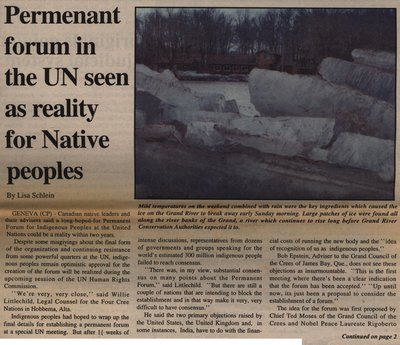"Permanent Forum In The UN Seen As Reality For Native Peoples"
- Publication
- Tekawennake News (Ohsweken, Ontario), 1 Mar 2000
- Full Text
- Permenant forum in the UN seen as reality for Native peoplesBy Lisa Schlein
GENEVA(CP) - Canadian native leaders and their advisers said a long-hoped-for Permanent Forum for Indigenous Peoples at the United Nations could be a reality within two years.
Despite some misgivings about the final form of the organization and continuing resistance from some powerful quarters at the UN, indigenous peoples remain optimistic approval for the creation of the forum will be realized during the upcoming session of the UN Human Rights Commission.
"We're very, very close," said Willie Littlechild, Legal Counsel for the Four Cree Nations in Hobbema, Alta.
Indigenous peoples had hoped to wrap up the final details for establishing a permanent forum at a special UN meeting. But after 1{ weeks of intense discussions, representatives from dozens of governments and groups speaking for the world's estimated 300 million indigenous people failed to reach consensus.
"There was, in my view substantial consensus on many points about the Permanent Forum," said Littlechild. "But there are still a couple of nations that are intending to block the establishment and in that way make it very, very difficult to have consensus."
He said the two primary objections raised by the United States, the United Kingdom and, in some instances, India, have to do with the financial costs of running the new body and the "idea of recognition of us as indigenous peoples."
Bob Epstein, Adviser to the Grand Council of the Crees of James Bay, Que., does not see these objections as insurmountable. "This is the first meeting where there's been a clear indication that the forum has been accepted." "Up until now, its just been a proposal to consider the establishment of a forum."
The idea for the forum was first proposed by Chief Ted Moses of the Grand Council of the Crees and Nobel Peace Laureate Rigoberto Menchu of Guatemala during the 1993 Human Rights Conference in the Austrian capital Vienna. It was conceived as a body which would address matters of fundamental importance to indigenous peoples and function at the highest levels of the UN.
Indigenous peoples appear to be getting much of what they want. A consensus has been reached for there to be equal representation and direct participation by indigenous peoples and governments in the forum and that it be a body that will report directly to the UN Economic and Social Council.
"In other words, it would be established in terms of the United Nations hierarchy at exactly the same level as the Commission on Human Rights," Epstein said "That's very, very significant."
Littlechild believes the proposed mandate of the Forum is too narrowly focused on issues dealing with economic, social and cultural rights. He is disappointed the mandate leaves out civil and political rights "which are very, very important for us in considering our land, natural resources and treaty rights."
Nevertheless, Littlechild considers what has been achived "a very significant victory." He remembered in 1977, indigenous peoples weren't even able to get into the United Nations building, let alone air their grievances.
He proudly notes how far the world's aboriginal people have come in 23 years to being at the point of achieving equality within the very system that had rejected them.
As it's shaping up now, the Permanent Forum will have a core group of elected indigenous and government representatives who will meet once a year.
There will be a permanent secretariat that will work throughout the year. It will be able to consult experts and carry out studies having to do with indigenous issues.
If the Forum is approved at the Human Rights Commission, which begins its six week session March 20, the proposal will go to Economic and Social Council for approval and then on to the General Assembly for adoption.
Epstein thinks the proposal will move through the UN's bureaucratic maze very quickly. "I think we'll have a forum in one year or two years at the outside."
But Littlechild said he will not participate as a core member of the Permanent Forum. He believes it's time for younger people to take the cause of indigenous rights into the future.
- Creator
- Schlein, Lisa, Author
- Media Type
- Newspaper
- Image
- Item Types
- Articles
- Clippings
- Description
- "GENEVA (CP) - Canadian native leaders and their advisers said a long-hoped-for Permanent Forum for Indigenous Peoples at the United Nations could be a reality within two years."
- Date of Publication
- 1 Mar 2000
- Subject(s)
- Personal Name(s)
- Littlechild, Willie ; Epstein, Bob ; Moses, Ted ; Menchu, Laureate Rigoberto
- Corporate Name(s)
- United Nations ; UN Human Rights Commission ; Human Rights Conference ; UN Economic and Social Council
- Local identifier
- SNPL003077v00d
- Language of Item
- English
- Geographic Coverage
-
-
Ontario, Canada
Latitude: 43.06681 Longitude: -80.11635
-
- Creative Commons licence
 [more details]
[more details]- Copyright Statement
- Public domain: Copyright has expired according to Canadian law. No restrictions on use.
- Copyright Date
- 2000
- Copyright Holder
- Tekawennake
- Contact
- Six Nations Public LibraryEmail:info@snpl.ca
Website:
Agency street/mail address:1679 Chiefswood Rd
PO Box 149
Ohsweken, ON N0A 1M0
519-445-2954



